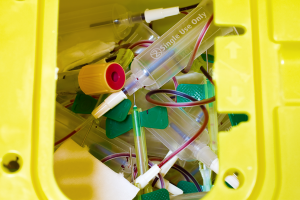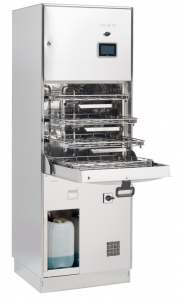How To Maximise Infection Control in A Hospital
 Although medical practitioners and, to a lesser extent, the general public were aware of the importance of infection control prior to the global pandemic known as COVID, there is little doubt that global awareness has increased exponentially. This will hopefully mean that members of the public will be much more accepting of guidance and will follow the rules when staying in or visiting a hospital, but as the guardians of the hospital, the overall responsibility will always lie with medical practitioners and those responsible for administering the hospital.
Although medical practitioners and, to a lesser extent, the general public were aware of the importance of infection control prior to the global pandemic known as COVID, there is little doubt that global awareness has increased exponentially. This will hopefully mean that members of the public will be much more accepting of guidance and will follow the rules when staying in or visiting a hospital, but as the guardians of the hospital, the overall responsibility will always lie with medical practitioners and those responsible for administering the hospital.
Whilst not a full and comprehensive guide, this article is designed to provide anyone that reads it with easily implementable ideas which, if followed, should dramatically improve infection control in any medical facility. So without further ado, let’s look at some ideas and suggestions you can implement today.
Never Stop Educating Your Staff
 Education, Education, Education was a famous political quote running up to one of the general elections, but whatever our political affiliations, there is no denying that education is a critical component of infection control in any hospital. Many hospitals have a high staff turnover, and even staff who have worked in your hospital for many years can still fall into bad habits. Every time a new member of staff begins to work at your hospital, they should have a compulsory induction which can involve any number of different things but should always involve education on the following topics.
Education, Education, Education was a famous political quote running up to one of the general elections, but whatever our political affiliations, there is no denying that education is a critical component of infection control in any hospital. Many hospitals have a high staff turnover, and even staff who have worked in your hospital for many years can still fall into bad habits. Every time a new member of staff begins to work at your hospital, they should have a compulsory induction which can involve any number of different things but should always involve education on the following topics.
Hand Hygiene
It is so easy in the hustle and bustle of a busy hospital to forget to wash your hands between patients, but of course, this could have horrific consequences. That is why it is imperative that staff initially receive some sort of input on hand hygiene which is then continually reinforced throughout the length of their employment.
How To Use PPE Properly
 It sounds silly, but many of us have never received any training when it comes to putting on gloves, face masks or many other types of PPE. And yet, during the pandemic, there was a lot of confusion over face masks as to the proper way to wear them. Take away any and all confusion by providing comprehensive training for any PPE they are likely to need to use throughout the course of their employment. If something does go wrong, it is imperative that you as an organisation can demonstrate that you provided adequate training in the use of this important equipment.
It sounds silly, but many of us have never received any training when it comes to putting on gloves, face masks or many other types of PPE. And yet, during the pandemic, there was a lot of confusion over face masks as to the proper way to wear them. Take away any and all confusion by providing comprehensive training for any PPE they are likely to need to use throughout the course of their employment. If something does go wrong, it is imperative that you as an organisation can demonstrate that you provided adequate training in the use of this important equipment.
The Safe Use and Disposal of Sharps/Decontamination of Equipment and the Environment
 Sharps and other medical equipment play an essential part in many procedures, but there must be stringent procedures in relation to their disposal or cleaning afterwards. Yellow sharps bins must be easily but safely accessible, and when it comes to the cleaning of medical equipment, then invest in a high-quality washer disinfector from Dekomed.
Sharps and other medical equipment play an essential part in many procedures, but there must be stringent procedures in relation to their disposal or cleaning afterwards. Yellow sharps bins must be easily but safely accessible, and when it comes to the cleaning of medical equipment, then invest in a high-quality washer disinfector from Dekomed.
These specialist pieces of machinery dramatically reduce the risk of staff cutting or infecting themselves when washing sharps or equipment, and just as importantly, you can be confident that the medical equipment has been professionally cleaned, which in turn will dramatically reduce the risk of any cross-contamination.
Ensure That There Are Strict Guidelines In Place and Communicated To All Staff

Additionally, every hospital will also have its own individual policies and procedures, which need to be communicated and understood by staff.
Aim To Implement A Cleanliness Culture Within the Hospital
Another easy way to ensure that everyone buys into the importance of infection control is to implement a culture and cleanliness. This means that infection control implementation applies to every staff member at the hospital, not just the medical staff. Managers, receptionists, and security all need to have an understanding of the importance of hygiene control, as this will not only help to maximise the effectiveness of the policy but also emphasises to staff that it is everyone’s responsibility. As a manager, it is important that you lead by example and ensure that you have a do-as-I-do methodology rather than a do-as-I-say.
Audit Regularly and Consistently
While all of the above is a firm foundation, it is essential that the focus remains consistent and is not viewed by your staff as just being the flavour of the month. Regular but non-predictable audits are the simple and effective way to do this. Some good examples of these would be
 Conduct hand hygiene observation audits. Anyone can watch a ward or cleaning station randomly to ensure that staff follow protocols and clean their hands as expected.
Conduct hand hygiene observation audits. Anyone can watch a ward or cleaning station randomly to ensure that staff follow protocols and clean their hands as expected.
Ensure that your below the elbows policy is being followed – If there is a below the elbows policy in place, anyone and everyone should feel empowered to challenge another member of staff, be that a porter, consultant or Chief Executive. Hygiene or the lack thereof is no respecter of position, so embrace and encourage a challenging culture.
Tackling and reducing infection control in a hospital is a constant challenge, but with everyone on board and a clear well-documented policy, it does not need to be an impossible task. Infection control can improve dramatically by investing in technology, matched with an ingrained culture.
For information on Dekomed washer disinfector machines or other options in which we can help you dramatically improve your disease control, call our friendly customer service team today on (0)161 483 7333
